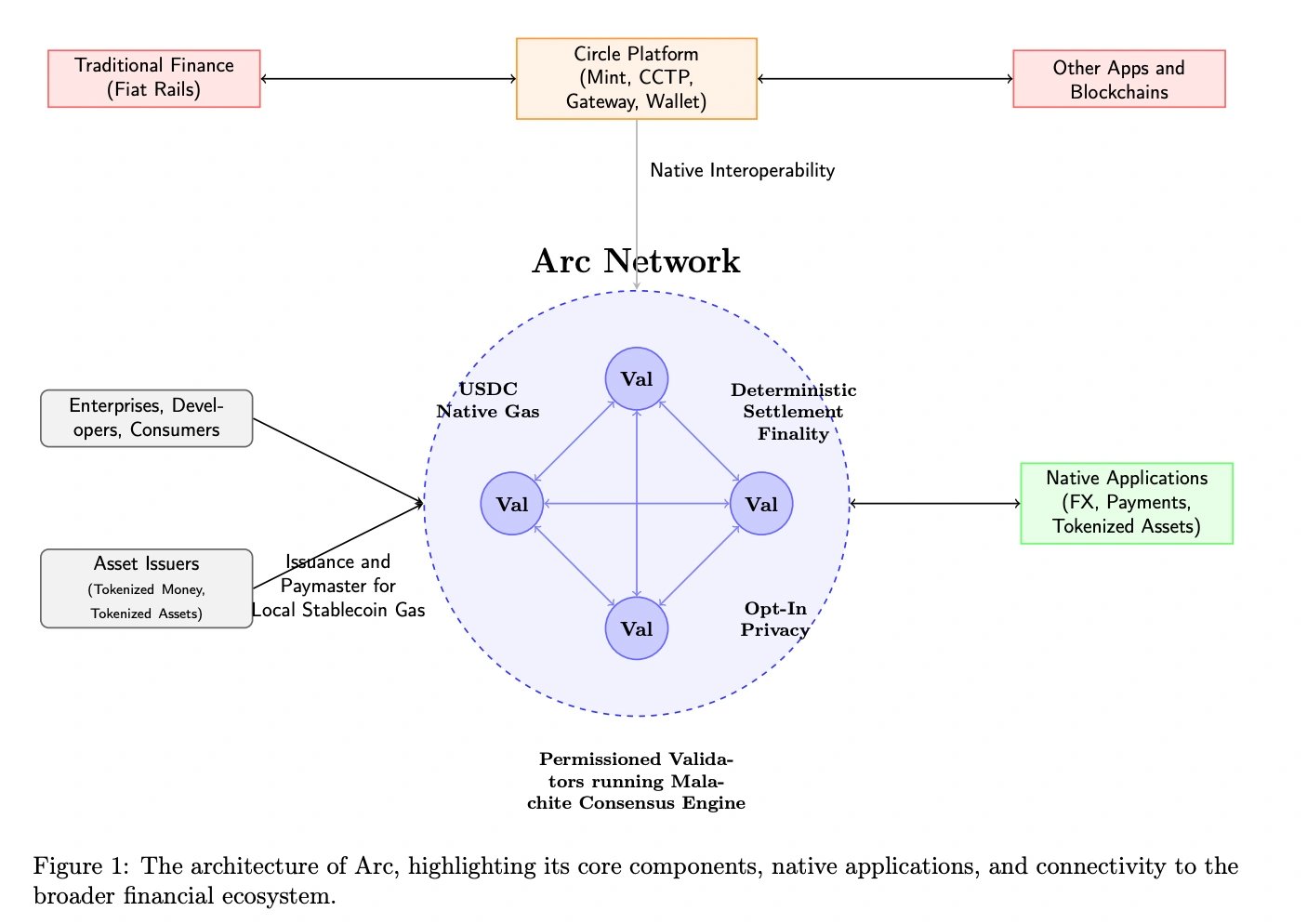订阅 wiki
Share wiki
Bookmark
Arc
0%
Arc
Arc 是一个专门构建的、与 EVM 兼容的 Layer-1 区块链,专为基于 稳定币 的金融而设计。它以 USDC 作为原生 gas,具有确定性的结算终结性、可选隐私和稳定的交易费用架构。Arc 针对稳定币原生用例(如全球支付、外汇和资本市场)进行了优化,是互联网上可编程货币的基础结算层。 [1] [3]
概述
Arc 定位为围绕 稳定币 构建的互联网金融系统的基础层。该项目的前提是,虽然稳定币已经展示了数字货币的潜力,但需要专门的基础设施来支持其在企业和消费者金融中的广泛采用。
该区块链被设计为开放和可编程的,为开发人员和企业构建金融产品和服务提供了一个平台。它力求将传统金融机构所需的可预测性和信任与公共账本的速度和全球覆盖范围相结合。 [1]
该平台由 Circle Technology Services, LLC 提供,该公司是 Circle Internet Group, Inc. 的子公司,后者是 USD Coin (USDC) 稳定币背后的关键实体。Arc 的架构是专门构建的,旨在解决基于区块链的金融中的常见挑战,例如波动的交易成本、缓慢的结算时间和缺乏敏感金融数据的隐私。通过关注这些领域,Arc 旨在成为稳定币支付、外汇 (FX) 和资本市场的核心基础设施。 [1]

历史
Arc 于 2025 年 8 月公开宣布。该项目在 X(前身为 Twitter)上的官方社交媒体账号也在同月建立,并在 2025 年 8 月 12 日发布了介绍性帖子,概述了其作为稳定币金融 Layer-1 区块链的愿景。 [2]
公开启动后,该项目开始接受对其私有测试网的早期访问申请,邀请开发人员和企业开始探索该网络的功能。 [1]
共识和终结性
该网络由名为 Malachite 的共识引擎提供支持。该引擎专为高性能而设计,旨在提供确定性的亚秒级交易终结性。这种快速结算能力对于服务于要求苛刻的企业级应用程序至关重要,在这些应用程序中,交易的确定性和速度至关重要。即时终结性确保一旦交易在网络上得到确认,它就是不可逆转的,这反映了传统金融系统的结算保证。 [1]
原生 Gas 代币
Arc 区块链的一个独特功能是使用 USDC 作为支付交易(gas)费用的原生代币。通过以与美元挂钩的稳定币计价 gas 费用,该网络旨在提供可预测和稳定的交易成本。这种方法使用户和应用程序免受其他区块链的原生加密货币通常相关的价格波动的影响,从而使在网络上运营的企业的财务规划和成本管理更加简单。 [1]
合规的隐私功能
Arc 集成了原生隐私工具,允许可选的保密性。这种“选择加入”隐私模型使用户和企业可以选择性地屏蔽区块链上的敏感财务信息。该功能旨在符合合规性,允许实体在维护数据隐私的同时,仍然遵守相关的监管和报告义务。这种平衡旨在使该平台适合必须保护机密客户或交易数据的机构。 [1]
集成外汇引擎
该区块链包括一个内置的外汇 (FX) 引擎,专为机构使用而设计。此功能用作链上询价 (RFQ) 系统,促进稳定币到稳定币货币对的价格发现和点对点 (PvP) 结算。该引擎旨在 24/7 全天候运行,为链上外汇交易提供可信且高效的环境,而无需依赖外部场所。 [1]
用例
Arc 专门构建为使用稳定币构建的新一代金融应用程序的基础设施。该平台的功能经过定制,旨在支持以下几个关键领域:
- 支付: 该网络的低廉、可预测的交易成本和快速的终结性旨在促进大规模的稳定币支付,从微支付到大型企业资金转移。
- 外汇 (FX): 原生外汇引擎为不同稳定币之间的 24/7 货币兑换提供了一个去中心化的场所,从而实现了更高效的跨境交易和流动性管理。
- 资本市场: Arc 旨在为代币化现实世界资产 (RWA) 和其他数字证券的发行和交易提供一个强大的平台,其中稳定性和合规性至关重要。
这些用例得到了平台稳定、高性能和可预测性的核心设计原则的支持。 [1]
发现错误了吗?
